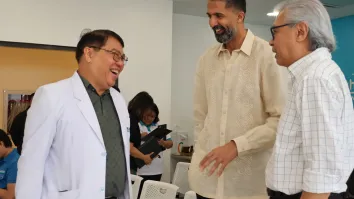Ageing Singaporean population boosts demand for senior care innovations
Experts highlight AI and robotics as key drivers in transforming aged care.
Singapore will be "super-aged" by 2026, with over 25% of its population aged 65 or older. With this shift, industry leaders are pointing to advancements in artificial intelligence (AI) and robotics as transformative tools in addressing its challenges and opportunities.
“Lifespan is getting expanded forever, but along with it, we are also kind of having increased responsibility to take care of [seniors], to help them age in place as much as possible, as healthy as possible,” said Ez Bala, Founder and CEO of The Alphind Group.
“Data, which used to be like a small form being filled by us, is now generated every single moment,” Bala explained. He emphasized the role of AI in making sense of this data, which is otherwise “humanly impossible” to process.
Janice Chia, Founder of Ageing Asia Pte Ltd, highlighted the practical applications of AI in aged care. “The most important thing about AI is the predictive analytics tools that can help prevent hospital readmissions,” she said, however, “One of the most important challenges in the use of AI today is the ethical use and data privacy.”
Robotics, meanwhile, is extending care beyond traditional settings. “Robots can now handle more complex tasks,” said Lim Chwee Foon, CEO of Asia Pacific at Eksobionics. She shared how exoskeletons are giving wheelchair-bound elderly individuals the chance to walk again, calling it “completely life-changing.”
“Mobility is a key element to active aging,” Lim added, noting how robotics can bring rehabilitation into community spaces and even homes.
The rapid integration of AI and robotics also raises critical ethical and governance questions. Bala stressed the importance of data privacy and its proper use. “We need to really kind of maintain the privacy of the person we are giving care to,” he said, adding that data should primarily be used for improving health outcomes.
Chia called for transparency in how data is used. “The public needs to know what the data is going to be used for,” she said, emphasizing the importance of clarity in enhancing trust in technology-driven solutions.
Lim raised concerns about the autonomy of AI systems, particularly as AI agents gain the ability to act independently. “The key question now is, to what extent do we need to keep humans in the loop? Ultimately, in aged care, we really want humans to have accountability,” she said.



















 Advertise
Advertise






